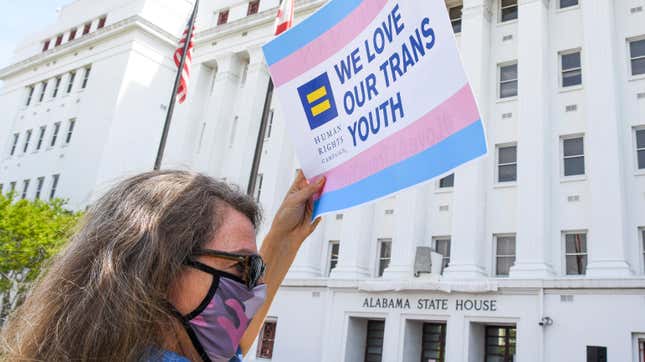Four Parents Are Suing Alabama Over ‘Unthinkable’ Ban on Trans Healthcare
Joining the parents are a clergy member and two medical professionals who regularly treat trans kids in the state.
JusticePolitics

Brianna Boe and her 12-year-old transgender son, Michael, live in Montgomery, Alabama. A lawsuit she just filed (under the pseudonym) against the state describes Michael as a happy child, initially; but at age 9, he “became depressed and anxious” and “started struggling academically and socially.”
In June 2021, Michael told Brianna that he was trans. He started to transition socially with a new name and male pronouns, and since then, “his mood has improved greatly.” Earlier this year, Brianna reached out the Children’s Hospital of Alabama to make an appointment for Michael to start evaluating what, if any, medical options could be available. But, the lawsuit contends, if a new state law goes into effect in May criminalizing providing transgender healthcare to kids, the appointment will be cancelled and Michael won’t be able to get even an initial assessment.
Boe is one of four parents on behalf of their children are challenging the anti-trans law in federal court. The lawsuit, filed Tuesday, asks the court to block the law from going into effect on May 8 while the case proceeds.
All parents are challenging the law anonymously because of the potential criminal liability in the new law as well as the safety of their families. S.B. 184 punishes parents and medical providers for administering or suggesting gender-affirming healthcare to trans kids, the suit alleges. If the law goes into effect, violations could be punished as a felony with up to 10 years in prison. The law also bans surgeries on minor’s genitals, which do not happen in Alabama anyway.
-

-

-

-

-

-

-

-

-

-

-

-

-

-

-

-

-

-

-

-

-

-

-

-

-

-

-

-

-

-

-

-

-

-

-

-

-

-

-

-








































